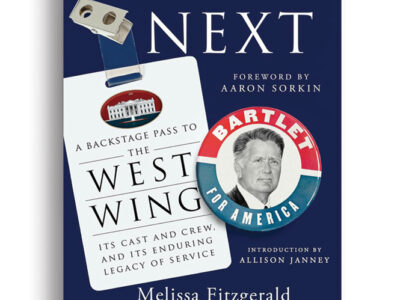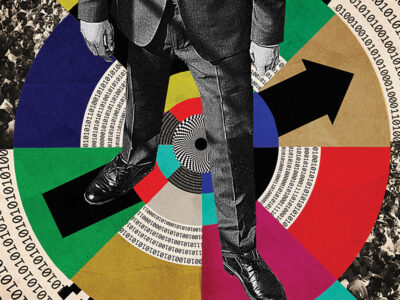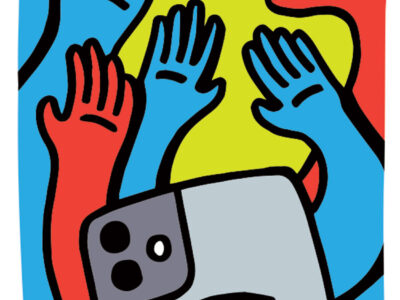“It’s wonderful to be back here at the last place where I was truly anonymous,” Joe Klein, C’68, was telling a modest-sized crowd at Penn earlier this semester. But since that anonymity took place during the sixties, he added, “I guess you could say I was oblivious as much as I was anonymous.”
Klein, the Washington columnist for The New Yorker, former columnist for Newsweek, and once-anonymous author of the best-selling political novel Primary Colors,
spoke about his evolution from oblivion to anonymity and beyond as part
of the School of Arts and Sciences’ Alumni Lecture Series. He also
spent some time probing “the new consensual banality” of America’s
political discourse and otherwise taking the pulse of the republic.
“What do you do when things are going pretty well?” asked Klein,
wearing a dark gray pinstriped suit and an unseasonable tan.
“Machiavelli had a word for it — I named a character in Primary Colors after that word: ozio, indolence.
He said that indolence was the greatest threat to a republic. And how
do we overcome that? Don’t these guys in Washington have a
responsibility to challenge us, to challenge you? I think that they do
— and I think that there are ways that we could be challenging you and
each other that we’re not.”
Noting
that societies have always had a point “where we asked children to
become citizens,” Klein told the students in the crowd: “We do owe you,
and you owe yourselves, the challenge of going through an initiatory
ritual.” Although he did not claim to know exactly what that ritual
should be, he did praise President Clinton’s original idea for a
“rigorous” national-service program, since
Klein’s own observations had convinced him that the programs that
“always work” have been those in which “inspired young people made
one-to-one contact with kids who needed it.”
He
recalled a seminal event in his journalistic career, when he was
challenged by someone in government to “do a piece about something that
works” instead of the usual “negative crap.” As a result, he now writes a
column at semi-regular intervals about something that works — and
inevitably gets “ten times as much mail” when he does.
“Now,
my editors usually weren’t all that interested in that,” he added. “My
editors were always interested in, ‘See what’s going on with Hillary.'”
And in constantly sniffing around for scandal, he said, “we have created
a truly noxious atmosphere that is very, very dangerous.”
Noting
that recent polls have convinced politicians “that you didn’t want them
to be angry at each other; you didn’t want them to be talking about
much of anything at all,” Klein argued that most politicians are now
following, not leading: “If the politicians aren’t going to inspire and
challenge us, then the journalists have nothing else to write about but
scandal.” Since most recent scandals have been, in his view, fairly
small potatoes, it was “kind of ironic that I became the subject of a
scandal last summer, and that the press behaved toward me in a way that I
described the press behaving in a book — and also in a way that I have
been critical of for ten years in my columns.” And a hundred years from
now, he suggested, “people are going to be sitting in a classroom like
this and studying this period the way we look back on Salem in the 17th
century.”
Throughout
history, he added, “societies have needed ceremonies and rituals. A
very important ceremony that we don’t have in this society is human
sacrifice. And this kind of takes up the slack.”
But,
he said, “When you’re on the other side of that, when you have the
twenty cameras facing you, as I did briefly last summer, it is
impossible to think straight. During my infamous press conference, I
found myself saying things that I realized I didn’t truly believe.
Because they were after me. There were twenty of them and me. They were
screaming at me! I don’t see how people can think straight.”
Klein, who resigned from his political commentator’s job at CBS News and took a leave of absence from Newsweek in the wake of his “outing,” recalled that at the end of Primary Colors,
“one of the characters asks [presidential candidate] Jack Stanton, ‘How
can you get up every day and do this?’ And I think that’s a legitimate
question. I don’t know how these guys do it. I have more respect for
them. And I think we have to be a little bit more humanitarian to each
other if this is going to hold together.”
Asked
what had created the “noxious political atmosphere” in the first place,
Klein suggested that his own generation — and the events of that era
— had a lot to do with it.
“Vietnam
was a pretty awful thing,” he said. “I remember getting in the caravan
going down to the moratoriums in Washington, and we were right — the
war was wrong. By the time I graduated from the University of
Pennsylvania, I felt my government was run by a war criminal. I think
that that atmosphere has informed the journalism of my generation to a
much greater extent than it should have. And it is something that I have
had to work very hard to overcome. And the way I have overcome is by
reporting it — by going out and finding the reality in the streets.”
The
other combustible element in the current atmosphere is competition “so
fierce that it leads us to lose our heads,” and he said that he had been
“really distressed” when Newsweek, “a publication of which I was
very proud, usually, reported that Colin Powell’s wife took drugs for
depression. What the hell business was it of ours? But it’s competition,
because if we didn’t report it, somebody else would have. I don’t know
how we get out of this, but it’s something that you should all watch
real carefully.”
Since his own integrity had been called into question last summer after he had spent weeks denying having written Primary Colors
— an ordeal that “has to be one of the weirdest experiences that a
writer has lived through in the media age” — Klein offered some
explanations.
“At
first it was just — I was chicken!” he said, drawing laughter. “I
mean, I didn’t know I could write fiction. I thought it would be a hoot
in a kind of Victorian way, and then I realized that the book would not
get a fair read if my name were attached to it. I wanted it to be read
as it was. An interesting thing happened: When it became a game for
everybody else, this furious, intense witch-hunt of a game, it stopped
being a game for me. I panicked. It got to be very scary.”
Klein
acknowledged that he “probably made some mistakes in letting the game
go on as long as it did,” and said he was “still kind of sorting through
what it means, what it meant, what I experienced.”
But, he concluded defiantly: “I wouldn’t trade it, and for those of you in the Class of 2000, the one piece of advice that I’d give you is: Go for it — take chances. This is a country where failure isn’t the end of the road; it’s just the beginning of the next adventure. I’m really thrilled that I wrote the book, and I’m going to write more — this was a lot of fun. And maybe I’ll find another pseudonym.”




